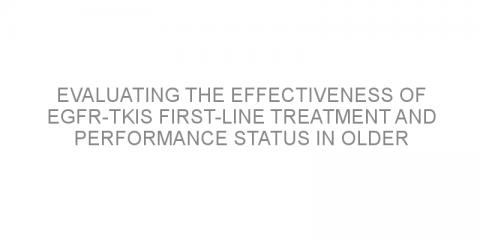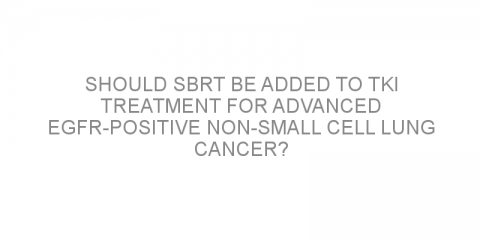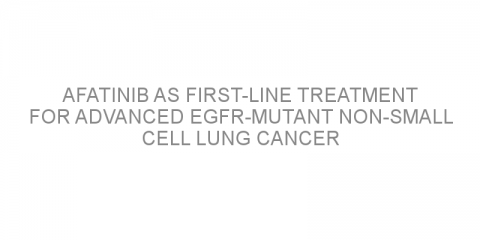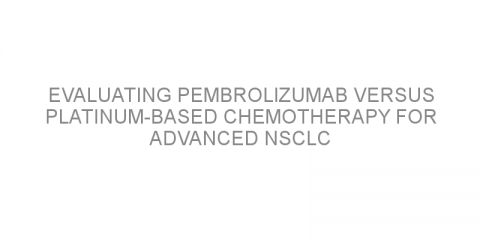In a nutshell This study evaluated the effectiveness and safety of first-line tyrosine kinase inhibitors (TKIs) with or without radiotherapy (RT) for the treatment of patients with oligometastatic (OM) non-small-cell lung cancer (NSCLC) having genetic mutations in the epidermal growth factor receptor (EGFR). The data showed that TKI plus RT was safe and...
Read MoreNon-small cell lung carcinoma genotype(s)-EGFR Posts on Medivizor
Evaluating the effectiveness of EGFR-TKIs first-line treatment and performance status in older patients with EGFR-mutant NSCLC.
In a nutshell This study evaluated the effectiveness of epidermal growth factor receptor (EGFR) tyrosine kinase inhibitors (TKIs) first-line treatment and performance status in older patients with EGFR-mutant non-small-cell lung cancer (NSCLC). The data showed that older patients with EGFR-mutated NSCLC who received EGFR-TKI first-line treatment with a...
Read MoreDoes tyrosine kinase inhibitors therapy after surgery benefit patients with EGFR-mutant resected NSCLC?
In a nutshell This study evaluated whether patients with non-small-cell lung cancer (NSCLC) having genetic mutations could benefit from epidermal growth factor receptor (EGFR) tyrosine kinase inhibitors (TKIs) therapy after surgery. The data showed that EGFR-TKI therapy after surgery significantly improved survival without disease progression in...
Read MoreShould SBRT be added to TKI treatment for advanced EGFR-positive non-small cell lung cancer?
In a nutshell This trial was carried out to assess the effectiveness of EGFR-tyrosine kinase inhibitors (TKIs) with stereotactic body radiation therapy (SBRT) in advanced non-small-cell lung cancer (NSCLC). The authors found that TKIs plus SBRT improved the survival without disease worsening for these patients. Some background Lung cancer...
Read MoreIs olmutinib effective in treating T790M-positive unresponsive non-small cell lung cancer?
In a nutshell This article looked at the use of olmutinib (Olita) in the treatment of T790M-positive non-small cell lung cancer (NSCLC) that was previously unresponsive to a tyrosine kinase inhibitor (TKI). The authors concluded that olmutinib had clinical activity and manageable side effects in these patients. Some background NSCLC accounts for...
Read MoreOsimertinib in EGFR-positive non-small cell lung cancer spread to the brain or the layers surrounding the brain.
In a nutshell This trial was carried out to examine the effectiveness of osimertinib (Tagrisso) in non-small cell lung cancer (NSCLC) that has spread to the brain of the layers of the brain (meninges). The authors concluded that osimertinib showed improved survival and had a good response rate in these patients. Some...
Read MoreLooking for patients with metastatic lung cancer to trial a treatment combination
In a nutshell This trial is being carried out to assess whether osimertinib (Tagrisso) should be used alone or with chemotherapy for lung cancer and abnormalities (mutations) in the EGFR gene. The main outcome that will be measured in this trial is survival without progression of the disease. This trial will take place in New Jersey and New...
Read MoreEvaluating osimertinib on the outcomes of patients with untreated non-small cell lung cancer
In a nutshell This study examined the safety and effectiveness of osimertinib (Tagrisso) compared to other targeted therapies for advanced non-small cell lung cancer (NSCLC). The authors concluded that osimertinib improved patient survival. Some background NSCLC accounts for the majority of lung cancers. Some...
Read MoreAfatinib as first-line treatment for advanced EGFR-mutant non-small cell lung cancer
In a nutshell This study wanted to see how well the medication afatinib (Giotrif) works in real-life settings, outside of clinical trials in patients with advanced non-small cell lung cancer (NSCLC). The study found that patients treated with afatinib had a good response rate and survival. Some background There are many...
Read MoreIs combined treatment with erlotinib and bevacizumab effective in non-small cell lung cancer?
In a nutshell This study investigated the effectiveness of erlotinib (Tarceva) and bevacizumab (Avastin) compared ti erlotinib alone in non-small cell lung cancer (NSCLC). They found that combined treatment improved survival after 12 months. Some background Non-small cell lung cancer (NSCLC) is a common type of lung cancer (LC)....
Read MoreEvaluating pembrolizumab versus platinum-based chemotherapy for advanced NSCLC
In a nutshell This study evaluated the effectiveness of pembrolizumab (Keytruda) versus platinum-based chemotherapy for patients with non-small cell lung cancer (NSCLC). This study found that pembrolizumab treatment resulted in longer overall survival than treatment with platinum-based chemotherapy. Some background NSCLC is the...
Read MoreErlotinib in patients with non-small cell lung cancer
In a nutshell This study wanted to find out if using the medication erlotinib (Tarceva) in patients with non-small cell lung cancer improved survival. The study found that using erlotinib was safe, and may reduce the need for radical surgery in patients with non-small cell lung cancer. Some background Epidermal growth factor receptor (EGFR) is...
Read More














